05 Apr2019
By Brandon R.T. Frost
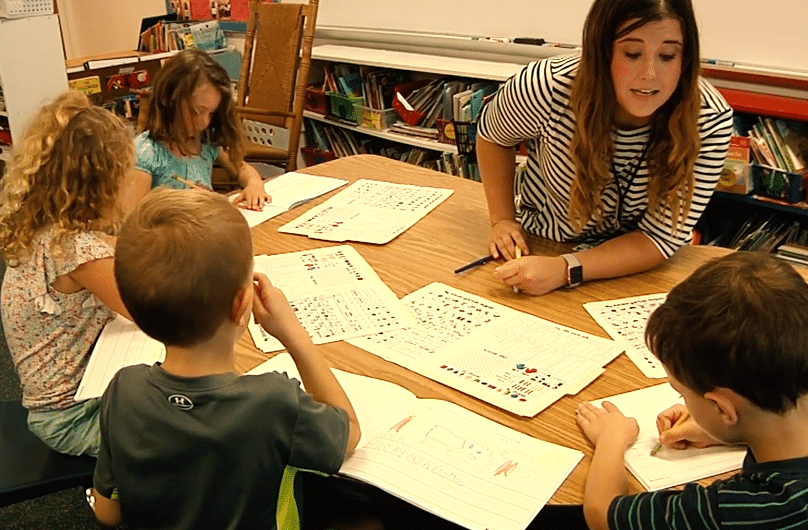
AACTE identified and documented two exemplary teacher preparation programs that ensure all of their candidates are ready to work with all students, including students with disabilities. We are pleased to feature a set of videos from each program documenting how they implement curriculum for dual certification (general education and special education) and feature extensive clinical preparation.
Bowling Green State University’s undergraduate Inclusive Early Childhood Program and Portland State University’s Secondary Dual Education Program support new and beginning teachers in teaching in inclusive classrooms. Both programs lead to certifications in general and special education. “These institutions ensure that all educators have the skills to work with students with disabilities in the 21st century,” said AACTE Consultant Jane West, “School districts scramble to hire these outstanding students, as they come with the mindset and the skillset to be effective with all students.”
05 Apr2019
By Matthew Wales

Are you ready to take the next step in your academic career, but uncertain where to begin? Learn what it takes to be an effective and authentic administrator and advocate during AACTE’s Leadership Academy this summer. Register today for this premier educator preparation training in Pittsburgh, PA, June 23-27.
In just the first 24 hours of AACTE’s Leadership Academy, you will
- Explore the concept of who you are as a leader.
- Examine who it is you may lead, and how you effectively lead them.
- Identify elements of leadership that are critical to your current or aspirational academic leadership position.
- Practice the concepts learned in a unique, hands-on simulation that will put your newly-acquired skills to the test.
05 Apr2019
By Deborah Koolbeck

The U.S. Department of Education has released its Notice of Inviting Applications for the Fiscal Year 2019 Teacher Quality Partnership (TQP) Grants in the Federal Register. TQP is the only federal initiative dedicated to strengthening and transforming educator preparation at institutions of higher education and to meet the workforce needs of high need school districts and schools.
05 Apr2019
By Shanett Dean
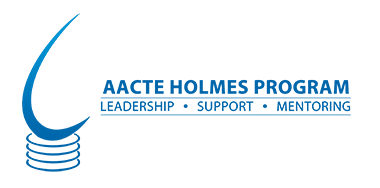
Data is a central and essential element in the work of scholar-researchers. Big data or data sets with information too sizeable or intricate for traditional statistical software, can be particularly challenging to analyze. Some students may be yet unaware of the nuances of big data and how it can inform their research. Additionally, others may wonder where to start or find sources for big data that can yield helpful insights for their work.
If you would like to increase your working knowledge of what big data is, where to find it, and how it can grow your analysis, Florida Atlantic University’s (FAU) Holmes Scholars invites you to attend “The Story of BIG DATA with All the Small Details” presented by Charles Dukes. This dynamic presentation on the mammoth data sources that are ubiquitous to our lives will not only provide participants with context and approaches for understanding big data, attendees will leave with a viable research agenda useful for their careers as social science researchers.
The presentation will take place on April 10, 2019 at 2:30 p.m. EST. If you are interested in video-conference attendance please RSVP for access to join us via Skype at http://bit.ly/HolFAU.
For more information, please contact me at sdean13@fau.edu.
05 Apr2019
By Bryan S. Zugelder
 As co-editors, we are seeking chapter authors for a book we are publishing with IGI Global for release in 2020 titled Handbook of Research on Leadership and Advocacy for Children and Families in Rural Poverty. This interdisciplinary book will address issues related to education, counseling, social work, public policy, health, and leadership.
As co-editors, we are seeking chapter authors for a book we are publishing with IGI Global for release in 2020 titled Handbook of Research on Leadership and Advocacy for Children and Families in Rural Poverty. This interdisciplinary book will address issues related to education, counseling, social work, public policy, health, and leadership.
Education researchers and practitioners are invited to submit a 1,000 to 2,000 word chapter proposal by April 25, 2019. All submitted chapters will undergo a double-blind review.
02 Apr2019
By Katrina Norfleet
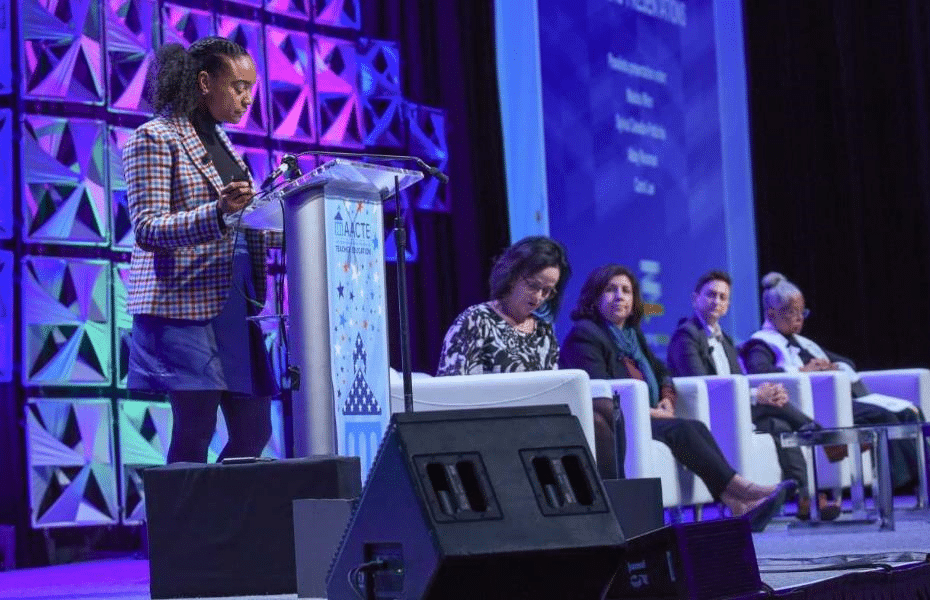
During the “Disrupting the Persistence of Oppression” Deeper Dive session, panelists explored the question: How does knowing content matter for disrupting the persistence of oppression? The panel discussion was moderated by Deborah Ball, director of TeachingWorks at the University of Michigan and included Maisha Winn, Chancellor’s Leadership Professor in the School of Education and co-director of the Transformative Justice in Education (TJE) Center at the University of California, Davis; Sylvia Celedon-Pattichis, senior associate dean for research and community engagement and professor of bilingual and mathematics education at the University of New Mexico; Abby Reisman, assistant professor of teacher education at the University of Pennsylvania; and Carol Lee, former Edwina S. Tarry Professor of Education, School of Education, of Social Policy and African-American Studies at Northwestern University.
Winn began the panel discussion with a scholarly presentation focused on restorative justice and shared a narrative framework she developed for teachers to consider when seeking justice in the school setting. The framework is based on four pedagogical stances: history matters, race matters, justice matters, and language matters. She presented the framework and shared her desire to add a fifth stance: futures matter.
02 Apr2019
By Ward Cummings
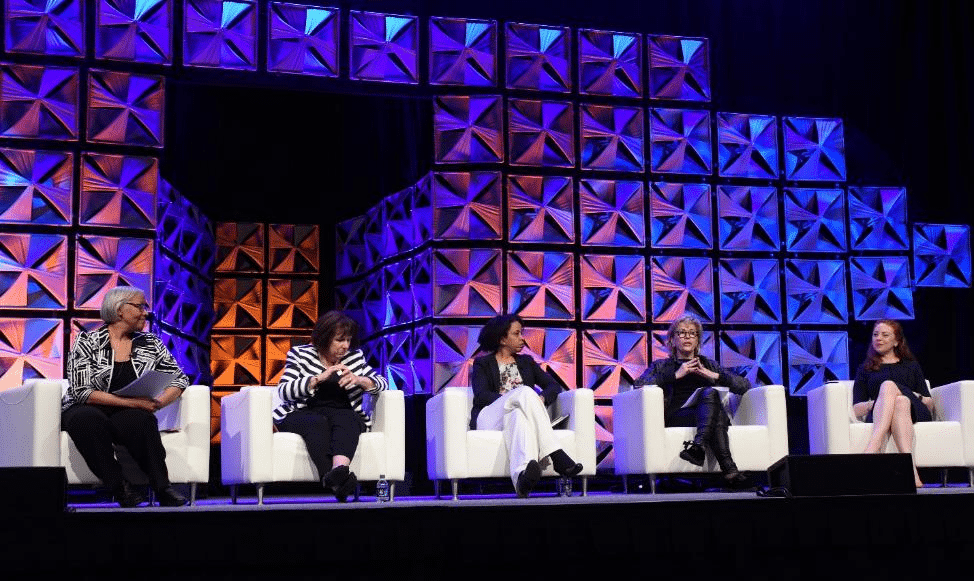
The “AACTE Initiatives toward Increasing Diversity, Equity and Inclusion in Colleges of Teacher Education” Deeper Dive session was held during the 2019 Annual Meeting. The session highlighted the association’s current, ongoing, and future commitments in these areas in a discussion moderated by Jennifer Robinson of Montclair State University and included panelists Lillian Sharon Leathers of William Paterson University of New Jersey and AACTE’s Jacqueline King, Jacqueline Rodriguez, and Jane West.
King, author of AACTE’s recently published Education Students and Diversity: A Review of New Evidence report, described the findings, which showed that education is the least diverse in bachelor’s degree fields. King shared other important data such as 50% of African American education students and 40% of Hispanic education students are independent; 30% of African American students and 20% Hispanic students had children; and 20% African American students were single parents. She emphasized that child care, for example, is an issue that cannot be ignored when considering the matter of diversity. In addition, 4% of Hispanic students are first generation students and 22% do not have a parent that has graduated from high school. The study revealed that one in five African American students work full-time and that the median family income of white, dependent students is more than double of their African American and Hispanic peers.
02 Apr2019
By Jerrica Thurman
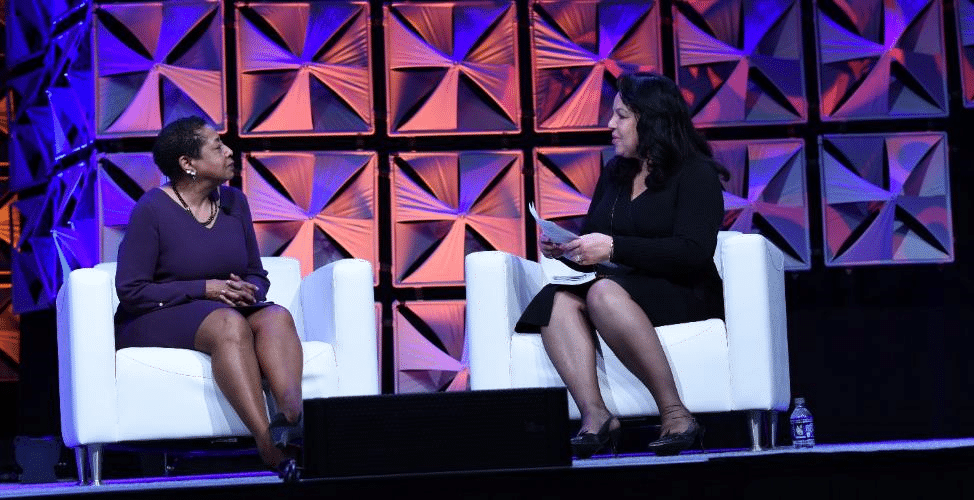
Annual Meeting Closing keynote speakers Mary Dilworth, editor of Millennial Teachers of Color, and Leslie Fenwick, dean emerita of Howard University, presented the topic, “Millennial Teachers of Color: Follow Their Lead, They Know Where We Need To Be,” on Sunday, February 24. During the session, the educators explored millennial teachers through a new lens by examining the intersection of race ethnicity and generation.
Dilworth has centered her career on teacher quality and preparation, with a keen focus on racial/ethnic and linguistic diversity and equity issues. Recently, she was a co-principal investigator for the National Science Foundation (NSF-DR12) project designed to recruit, prepare, license, and employ middle and high school science teachers from underrepresented groups. In addition, she served as a visiting professor and director of the Center for Urban Education at the University of the District of Columbia. Earlier in her career, she was a research fellow with Howard University’s Institute for the Study of Educational Policy (ISEP) and became widely recognized for heightening the national discourse on the disparate impact of licensing tests on underrepresented groups.
02 Apr2019
By Katrina Norfleet
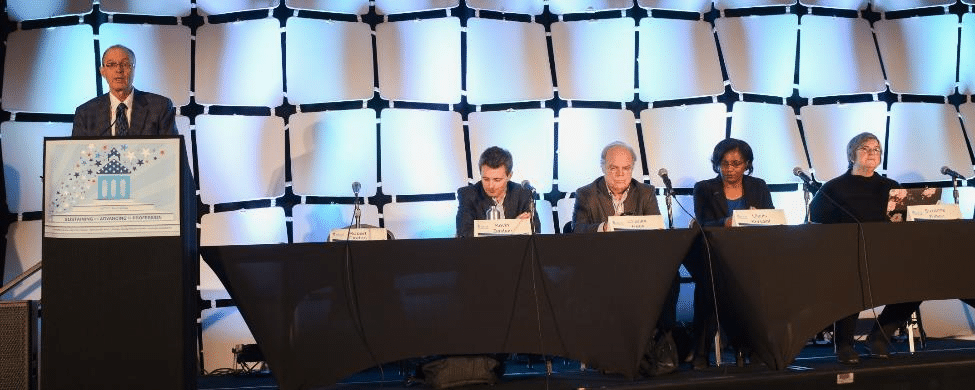
The “Data Systems” Deeper Dive session, held during the AACTE 2019 Annual Meeting examined the possibilities and challenges for using information and evidence-based research to improve teacher education programs. The discussion was led by moderator Robert Floden, dean of the College of Education at Michigan State University, and included four panelists: Kevin Bastian, senior research associate, University of North Carolina (UNC) and director, Teacher Quality Research Initiative Education Policy Initiative at Carolina (EPIC); Charles Peck, a professor of teacher education and special education at the University of Washington; Suzanne Wilson, Neag School of Educatin Endowed Professor of Teacher Education at the University of Connecticut (UConn); and Gladis Kersaint, dean, Neag School of Education at UConn.
The robust discussion opened with Bastian sharing the details of a two-pronged study conducted by EPIC that pairs student teaching data with workforce outcomes. He stated, “The problem we’re interested in addressing is how can programs take a mountain of performance assessment data and identify what we might call actionable evidence within it.”
02 Apr2019
By Ward Cummings
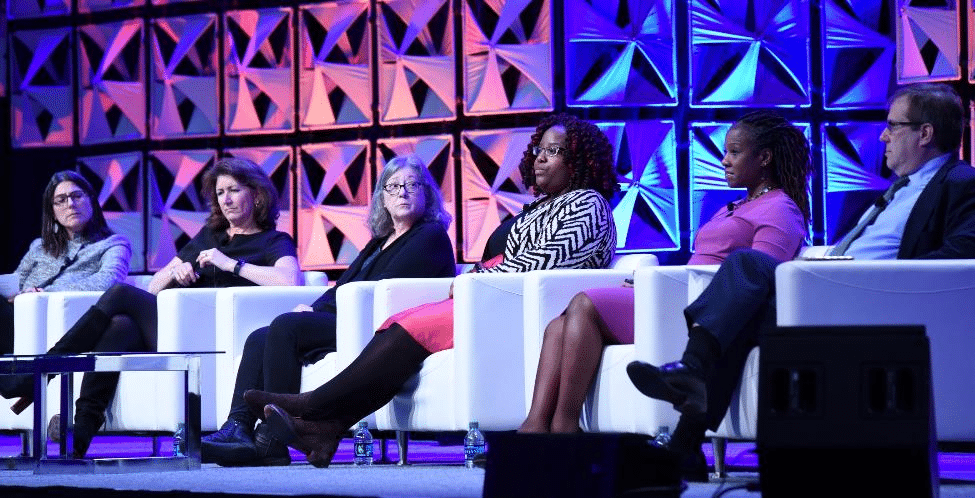
The Deeper Dive session, “Too Expensive to Ignore,” held during the AACTE 2019 Annual Meeting explored the many creative ways educators are working to address the high costs associated with becoming a teacher. The panel discussion was moderated by Karen DeMoss, executive director of Prepared to Teach, Bank Street College of Education, and the presenters were Tara Kini, director of state policy at the Learning Policy Institute (LPI); Karen Riley, dean of the College of Education at the University of Denver; Karen Kindle, division chair, Teacher Residency and Education at the University of South Dakota (USD); Jeannie Aversa, coordinator of educator effectiveness at the Syracuse City School District; and Nichole Brown, director of field placement and project director, Teacher Opportunity Corp II at SUNY Oswego. The group of educators engaged in a lively conversation about how to create sustainable funding for teacher residencies.
DeMoss began the discussion with an overview of the reasons solutions to the funding problem are necessary. She shared that attracting diverse candidates to the teaching profession requires a focus on the money matters that teaching candidates care about. For example, 40% of undergraduates and 76% of graduate students work full time, and they incur debt that is often untenable in comparison to the salaries they can expect as teachers.
02 Apr2019
By Jerrica Thurman
 AACTE is excited to announce registration is open for its 2019 Washington Week. This signature event is held annually in the nation’s capital, with participation from AACTE and the Association of Teacher Educators (ATE) state chapter leaders, Holmes Scholars, and AACTE members and non-members alike interested in advocating for the profession. Under the theme “Your Voice Matters,” this year’s Washington Week will be held June 2-5 at the Renaissance Arlington Capital View Hotel in Arlington, VA, and on Capitol Hill.
AACTE is excited to announce registration is open for its 2019 Washington Week. This signature event is held annually in the nation’s capital, with participation from AACTE and the Association of Teacher Educators (ATE) state chapter leaders, Holmes Scholars, and AACTE members and non-members alike interested in advocating for the profession. Under the theme “Your Voice Matters,” this year’s Washington Week will be held June 2-5 at the Renaissance Arlington Capital View Hotel in Arlington, VA, and on Capitol Hill.
01 Apr2019
By Deondra Gladney and Stephanie Jones-Fosu
The AACTE Holmes Scholars Program recently welcomed two new members: University of North Carolina at Charlotte (UNCC) doctoral students Stephanie Jones-Fosu and Deondra Gladney. The two Scholars share their experience as first-time AACTE Annual Meeting and Holmes Preconference attendees.
Stephanie’s Reflection
The Holmes Scholar Program is designed to provide equitable opportunities to emerging scholars from underserved populations. By having the distinct opportunity to be one of first Holmes Scholars from UNCC, an entire level of educational greatness has been literally dropped in my lap. During the 2019 AACTE Annual Meeting in Louisville KY, the Holmes Program created an exclusive preconference event where Holmes students at various levels of education came together to learn and grow from Scholars around the country.
29 Mar2019
By Reena Patel-Viswanath
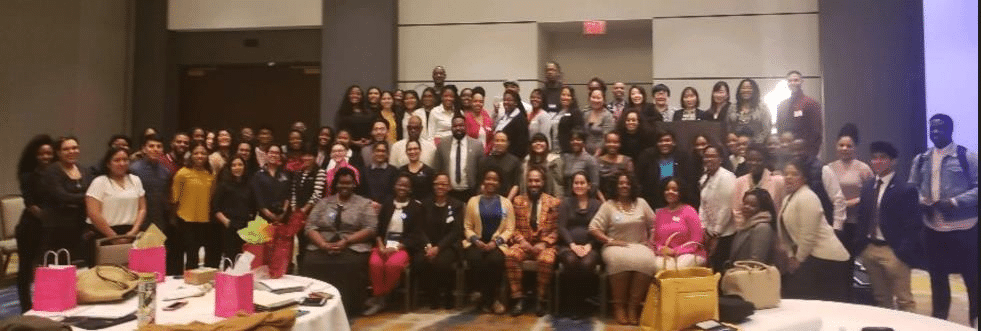
The 71st AACTE Annual Meeting was held in Louisville Kentucky from February 22-24, 2019. The AACTE theme this year was “Sustaining and Advancing the Profession.” The attendance was impressive, surpassing the number of attendees from previous years. The meeting allowed the members and alumni of the AACTE Holmes Program to escape daily routines, work distractions, and be fully present during a vibrant and innovative experience. This special environment fostered rich dialogue, sharing of research ideas, and collaboration on finding solutions to complex problems.
Interactive Sessions, Dynamic Conversations, Innovative Solutions, and Tangible Outcomes
The AACTE Holmes preconference agenda centered around growth—both professionally and personally. While lecture-style sessions are beneficial, this year the strategic planning team implemented more interactive sessions. For example, during the Career Choice Pathway sessions, the audience was intentionally involved and invited to participate in dialogue. This year also consisted of tangible outcomes such as productive writing skills. A session was dedicated for focus based-research writing, which allowed for experimentation of a new writing tool to aid in efficient writing. Students were able to share and connect over similar writing experiences and provide guidance on how to stay motivated. Lastly, this year we were honored to have alumni host sessions, provide their mentorship, and invite collaboration on projects.
29 Mar2019
By Chandra Floyd
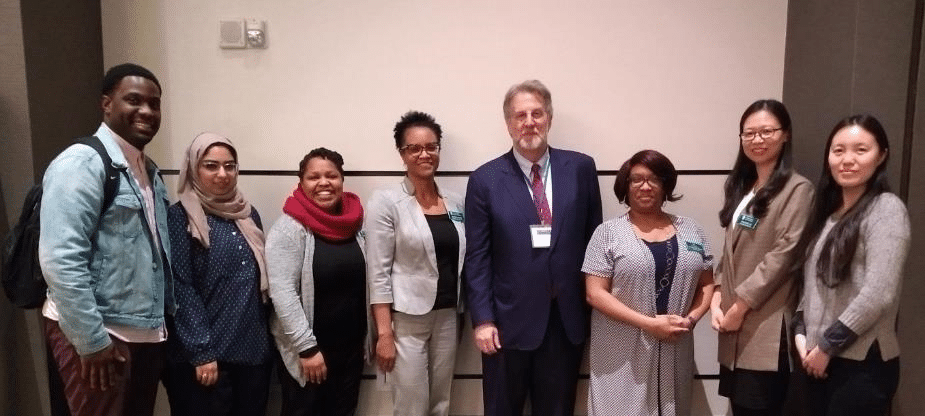
Spencer Niles, dean of the School of Education, College of William & Mary poses with Holmes Scholars (L-R) Okenna Egwu, Leila Warraich, Jessica Scott, Denise Lewis, Chandra Floyd, Jingjing Liu, Shuhui Fan
Twelve College of William & Mary (W&M) Holmes Scholars attended the Holmes Scholars Annual Meeting in Louisville, KY in February as part of the 71st American Association of Colleges for Teacher Education (AACTE) Annual Meeting. The AACTE Holmes Program encourages diversity in education by providing mentorship opportunities to students from high school through doctoral programs who are interested in careers in education. William & Mary’s 14 current Holmes Scholars are high-achieving doctoral students from populations underrepresented in higher education.
29 Mar2019
By Brandon R.T. Frost
AACTE invites you to view a livestreamed presentation and panel discussion about the results of a new, groundbreaking study by the RAND Corporation on the impact of principal pipelines on districts, principals and students. The livestream is on Monday, April 8 from 10:30am – 12:00 noon ET. Register now!
Research has long confirmed principals’ influence on student achievement and the role districts play in shaping school leadership. Yet, until now, there’s been no evidence that districts approaching school leadership strategically and systematically could achieve benefits districtwide.
Launched in 2001, the Wallace Foundation’s Principal Pipeline Initiative (PPI) sought to test this hypothesis. The foundation funded six districts that implemented four interlocking components of a principal pipeline: rigorous leader standards, high-quality pre-service training, hiring procedures informed by data, and on-the-job evaluation and support.






 As co-editors, we are seeking chapter authors for a book we are publishing with IGI Global for release in 2020 titled Handbook of Research on Leadership and Advocacy for Children and Families in Rural Poverty. This interdisciplinary book will address issues related to education, counseling, social work, public policy, health, and leadership.
As co-editors, we are seeking chapter authors for a book we are publishing with IGI Global for release in 2020 titled Handbook of Research on Leadership and Advocacy for Children and Families in Rural Poverty. This interdisciplinary book will address issues related to education, counseling, social work, public policy, health, and leadership.






